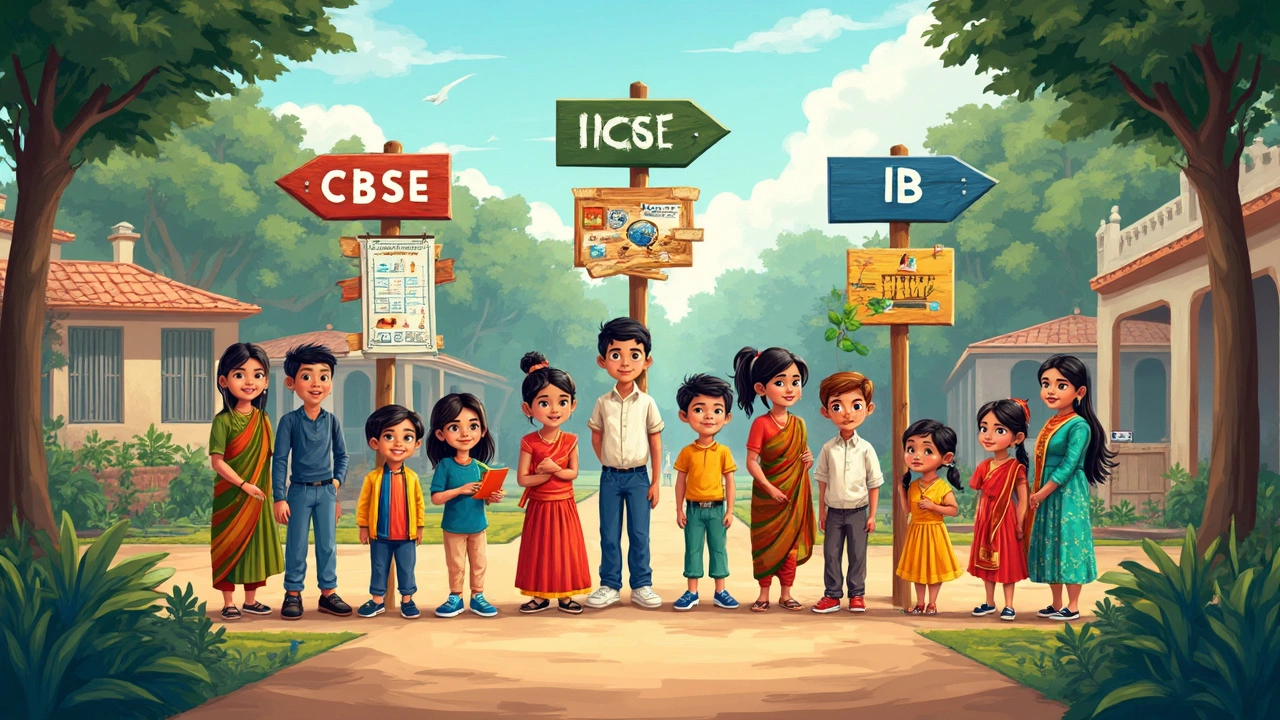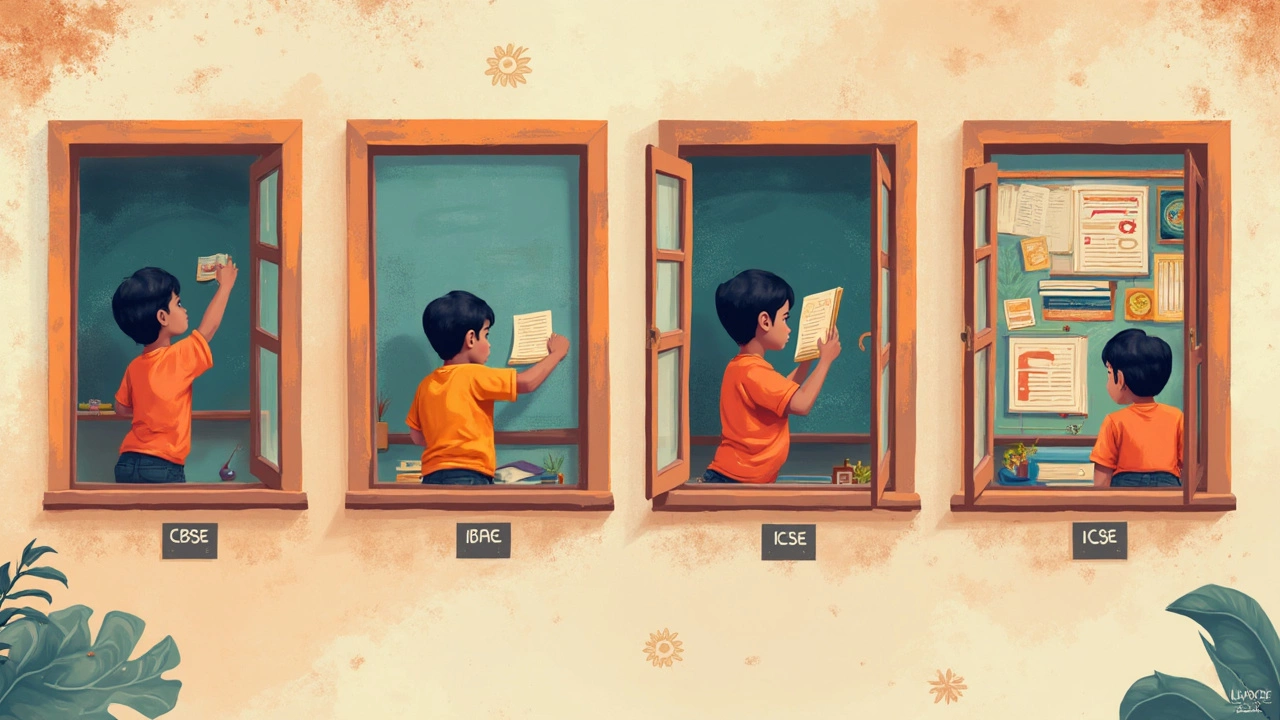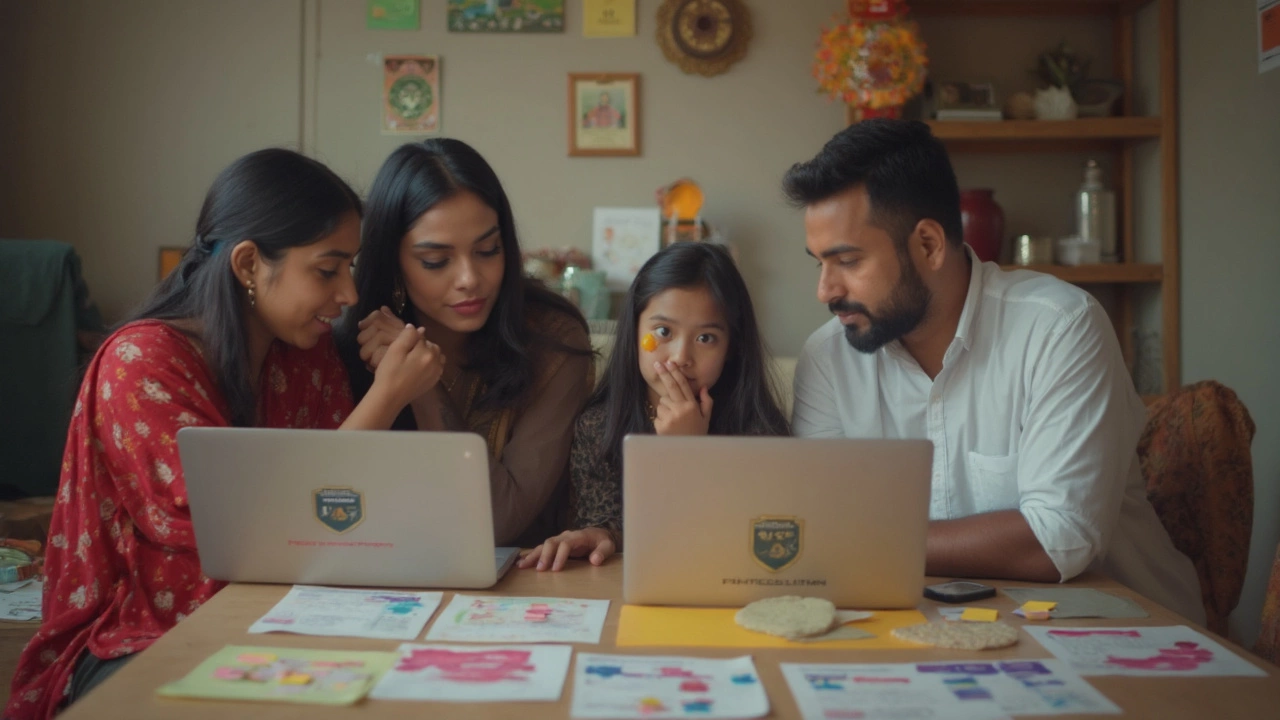Best Syllabus for Kids: CBSE, ICSE, IB & Montessori Compared

Picture a parent’s WhatsApp group. Big debate. "Which syllabus is best for kids?" Some people say CBSE. Others cheer for ICSE, IB, or traditional state boards. Toss Montessori and Waldorf into the mix, and suddenly, picking a school feels like picking stocks. But it’s not just about marks—it shapes your kid’s mindset, learning habits, and sometimes, what they dream of doing with their life. So, what makes each syllabus tick? Why do parents lose sleep over these choices? It turns out what works for one child can totally misfire for another. Let’s break down these schooling options with zero sugar-coating and see how they each fit different kinds of families and kids.
The Most Popular Syllabuses Explained: What Makes Them Unique?
I’ve lost count of the number of park bench chats, coffee breaks, and even dog-walk talks (thanks to Charlie, my golden retriever) where parents swap war stories about which syllabus delivers the best results. Let’s get straight to what each system offers and where it stumbles, using real-world info, not just what’s on school brochures.
The "big four"—CBSE, ICSE, IB, and Montessori—show up in nearly every city across India and even shape plenty of international school setups. Each one carries its reputation, quirks, and, sometimes, a crowd of skeptical parents with strong opinions.
- CBSE: The Central Board of Secondary Education rules the school scene in India, especially in metro cities. It’s run by the central government, locked tight onto a “one-for-all” approach. CBSE is famous for its focus on science, math, and languages. Exams follow a strict pattern, mostly theory-driven, and there’s usually a clear roadmap—solid for kids eyeing engineering or medical entrance exams, since most competitive tests stick closely to the CBSE layout. Here’s a fact: Around 25,000 schools in India and 28 countries abroad follow CBSE.
- ICSE: The Indian Certificate of Secondary Education gets private school fans cheering. ICSE feels broader: its English is tougher (parents in book clubs always mention all those essays and novels), and it offers a wider list of arts, humanities, and science subjects. There’s less spoon-feeding than CBSE, and it kicks the door wider for projects, lab work, and creative subjects. Fun fact—past students often do well in international English-language exams and universities, because they’ve been grilled on grammar and writing.
- IB: The International Baccalaureate can seem intimidating but also kind of glamorous. IB’s biggest selling point is how it gets kids to "think." Expect a focus on research, projects, presentations, and working in groups. It’s not about rote memorization. Less about cramming, and more about connecting ideas. IB schools sprawl across 159 countries; the curriculum is a passport, not just a textbook. A 2023 survey found IB Diploma students were 20% more likely to get into top global universities, mainly because of its focus on essays and independent research.
- Montessori: Picture the classroom—soft colors, baskets of beads, lots of free movement. Maria Montessori’s method is all about mixed-age groups, freedom to pick activities, and uninterrupted play. Kids get to choose their gears, whether it’s math, puzzles, or art. No one-size-fits-all tests, but teachers keep careful notes on progress. If you peek into a Montessori preschool, you might see a five-year-old make a sandwich alone while a younger child lines up blocks.
Sneaky but true: The state board option is still hugely popular, especially for families who move within a state or want a simpler, less expensive setup. Some state boards are modernizing, others lag behind in English and digital learning; it depends where you live.
One detail that always pops up—no syllabus is one-size-fits-all. Kids who are visual or hands-on, like building models or drawing, tend to enjoy ICSE and IB. If your child likes clear rules, math puzzles, or needs structure, CBSE can be a win. For the little explorers who ask “why” nonstop, Montessori is nurturing and patient. Maybe your kid’s a social butterfly, or maybe they’re happily lost in a book—these learning systems let different personalities shine.

Pros, Cons, and Quirks: Matching the Syllabus to Your Child
The school that turned your neighbor’s kid into a math whiz could turn your child into a ball of stress. Because every syllabus bakes in its own flavor—some sweet, some a bit sharp. Let’s dig in deeper, syllabus by syllabus, and point out stuff that doesn’t always show up on official websites.
CBSE’s top perk is predictability. Exams are no surprise—old question papers let you spot patterns, and schools prep students for the format from day one. The focus on science, math, and languages makes sense for families aiming at IITs or AIIMS. But—big but—it can lean a bit too much into textbook learning. Not as much room for debate or outdoor experiments, unless you have a creative teacher. That said, have you seen the national Olympiad medals list? CBSE schools show up regularly. Parents love that CBSE textbooks (NCERT) are now free online too.
ICSE schools tend to have smaller classes (less than 30 kids per teacher), which means more debates, drama, and play-based lessons. The English coursework? Next level: Shakespeare, modern mysteries, even world history. It’s not a secret that some Indian students in Oxford or Harvard came from ICSE backgrounds—they’re used to essays and critical thinking. But if your child isn’t into pages of writing or big projects, ICSE might feel overwhelming. Another tip: ICSE is heavier on internal assessments, so consistent effort matters more than last-minute cramming.
IB environments can feel almost like college. Group presentations, major essays (like the Extended Essay in grade 12), and real-life projects about their own communities. The IB PYP (Primary Years Programme) lets eight-year-olds organize a "market day" with their own stalls and budgets. The curriculum’s global focus makes moving between countries smoother. But, the IB can get expensive (up to double the annual fees of a typical city private school), and fewer Indian colleges recognize it easily without converting grades.
Montessori is catchier for the youngest kids—there’s no rush. Kids tinker with the same activity for weeks until they “get it.” The classes are mixed—someone aged four might work alongside older and younger students. Kids learn to be independent (prepared snacks, tying their shoes), and mistakes are seen as part of the game. No rigid exams. But transition to mainstream systems (like CBSE or ICSE) after a few years can be tough for kids used to lots of flexibility. Parents need to get involved at home, guiding social skills too.
For state boards, the story gets mixed. Some states like Kerala have strong English and science programs; others lag behind. If you’re moving cities a lot (due to government jobs, say), this stability can help. Plus, lower fees, local language focus, and easier exams work well for some families. But fewer options for advanced science labs or international competitions means less depth for high-achieving kids.
I'll add one odd observation: every year, my friend group argues over board switchers—the kids who move from a relaxed Montessori or IB school straight into the land of CBSE or ICSE. It’s a culture shock for many. Suddenly, it’s all about marks, deadlines, strict rules. Some kids blossom, others feel lost. That’s why early conversations with your child matter—ask, don’t assume.

Smart Tips to Pick What Actually Fits (Not Just What's Trendy)
So, where do we go with all this info? The “best” syllabus isn’t really about textbooks. It’s about what kind of kid you have, where you live, and what feels right for your family’s vibe. Here’s what those late-night school-hunt veterans can teach us about making the call.
If your family moves between states—or countries—often, CBSE and IB are both practical. CBSE’s national footprint guarantees smooth admissions; IB’s international spread makes hopping borders easier. Have a child who struggles with memorization but lights up during science fairs or art projects? Look at ICSE or IB, which let exploration guide the process and stress creativity.
Preschool and lower primary is where Montessori shines, especially for parents who want kids to grow independent and get hands-on before settling into books. If you plan to eventually put your child into a more mainstream system, chat with teachers about transition plans starting around age six or seven.
Check out how much screen time and homework each syllabus expects. Some CBSE schools still run the "notes on the blackboard" model, while good IB and ICSE schools use interactive assignments and project-based learning. Hunt for schools that blend old and new—modern libraries, music rooms, and safe sports spaces. Ask for a day’s schedule: does it include nature walks, drama club, and no-tech zones? This tells you a lot about whether kids feel inspired or bogged down.
Don’t buy into shiny ranking ads or viral online “top school” lists. Instead, join local parent forums—these places are goldmines for honest, sometimes brutal, reviews. Every year, schools reinvent their teaching to stay relevant. Last year, one neighborhood ICSE school paired with a tech startup to get AR biology lessons. Another started farm visits weekly. These extras aren’t on the actual syllabus, but they lift the entire school experience.
Talk with your child, not just other parents. Some children want structure (like CBSE); others thrive with choice (like Montessori and IB). Get them to visit classes before enrolling. Watch which classrooms make them curious, where teachers seem approachable, and whether other kids look engaged.
There’s a tendency to chase the current “winner”—one decade, everyone’s mad for CBSE, then it’s IB or ICSE. Trends can flip as competition exams change, or new edtech options arrive. Stick to what helps your child love to learn. And remember: switching boards isn’t a failure, it just means you’re tuning the setup. Plenty of successful people switched boards during their school days—Zomato’s founder started with a state board, then moved to a CBSE school, then went abroad.
One last tip: teachers and the school culture matter even more than the board. A passionate, creative teacher can make even a rigid syllabus exciting. I’ve watched Charlie, my dog, get more patient every time he hangs out with kids who love exploration—it rubs off. In the same way, your child will pick up values, habits, and energy from the school community, not just the books.
All in, don’t stress too much about finding the "perfect" answer. Know your child, understand the best syllabus for kids for your context, and don’t be afraid to adapt. Sometimes, the best thing you can do is listen, watch, and trust your own gut as much as the experts.
Write a comment